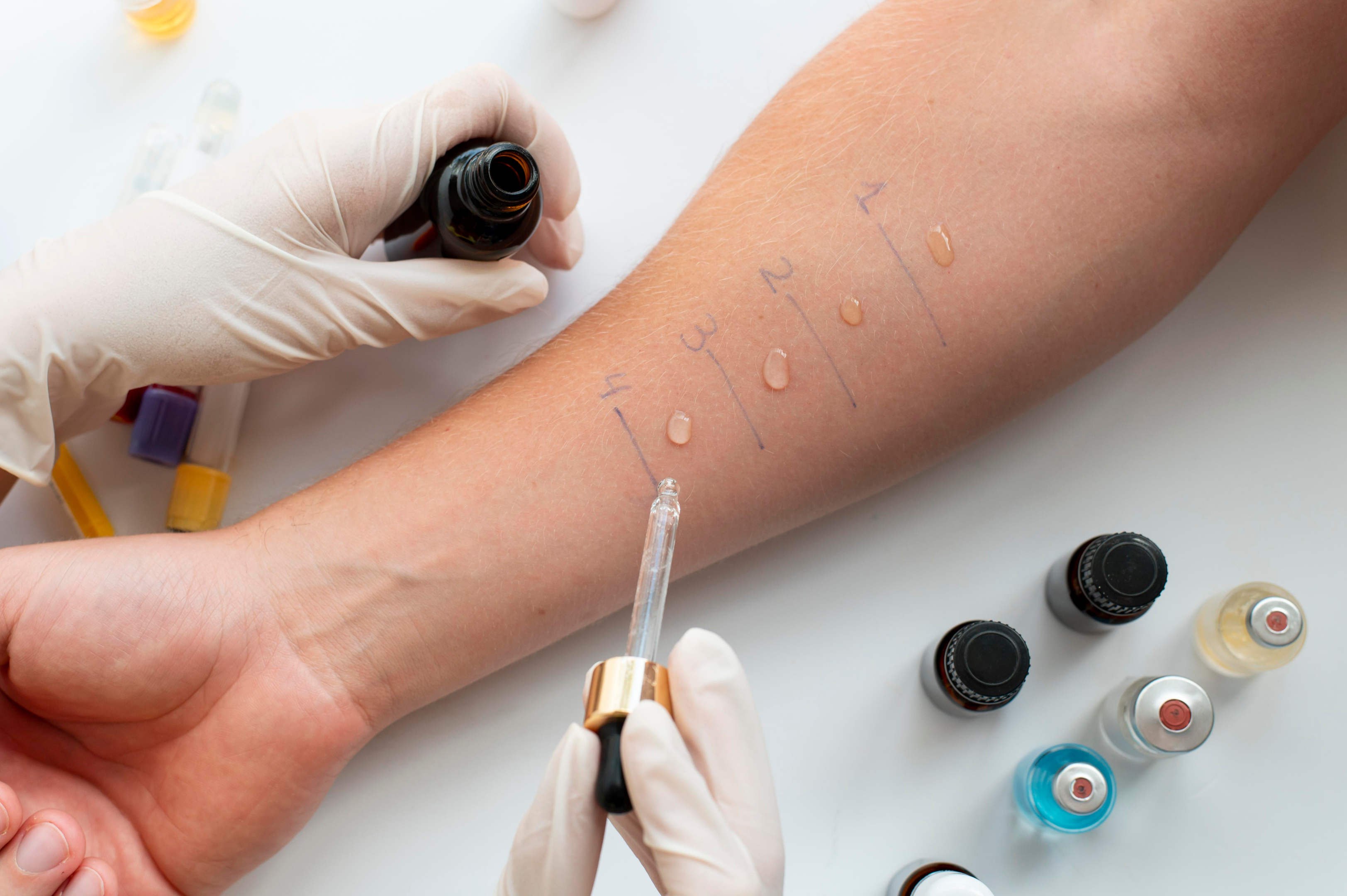Could I have an allergy to alcohol?


An alcohol allergy or intolerance is rare but can cause severe life-threatening symptoms.

An allergic reaction develops in response to any foreign body called the allergen. The immune system reacts to these allergens, causing clinical symptoms. The most common allergens are dust, pollen, pet dander, and food. Sometimes, the immune system begins to identify various foods and drinks, e.g., alcohol, as allergens leading to alcohol allergy.
What is alcohol allergy? What causes it? What are the signs and symptoms of alcohol allergy? How is it diagnosed and treated, and when do you need to consult the doctor? What is the difference between alcohol allergy and alcohol intolerance? We will be answering these frequently asked questions in this article.
The immune system is tasked with defending the body from foreign agents. Sometimes, it identifies the alcohol as a foreign agent and produces antibodies causing adverse symptoms. True alcohol allergy is rare, and the incidence varies with different products.
For example, a study published in Clinical and Experimental Allergy in 2008 noted that 8% of users reported allergic reaction symptoms after red wine consumption. This incidence rate is significant, given that 58% of adults in the UK drink alcohol at least once a week. Let's know what causes you to become allergic to alcohol.
You can become allergic to any food. Our Food Intolerance Test can be instrumental for you as it can trace your intolerance to various foods. It just needs the blood from a single finger prick and detects the antibodies (IgG) in the body, which also cause allergic reactions. Click here for more details and get your kit.
There is no definitive cause of allergic reactions. However, the following factors can have a role;
If you have any other allergy (e.g., skin allergy, rhinitis, food allergy, drug allergy, atopic eczema, asthma etc.), the risk is high that you will also develop alcohol intolerance and allergy.
The allergic reaction can also develop spontaneously. The body identifies alcohol as a threat and reacts to it. However, allergic reactions to alcohol are infrequent, and often, these are related to the other ingredients in alcoholic beverages.
The other ingredients in alcoholic beverages, including artificial flavourings, egg components, seafood proteins, rye, yeast, wheat, grapes, hops, barley, gluten etc., can be responsible for alcohol intolerance. The tests will determine the cause of allergic reactions for proper treatment.
Some immune system diseases are also related to allergic reactions, e.g., Hodgkin's lymphoma etc.
Regardless of the cause, the body produces antibodies (IgE) whenever it comes in contact with alcohol, causing severe symptoms after alcohol consumption.
Like other allergic reactions, the symptoms can be mild, e.g., itchy eyes, mouth itching, skin rashes etc., or severe, e.g., anaphylaxis, vomiting etc. Anaphylaxis is a very severe and potentially life-threatening condition causing rashes, decreased heart rate and even shock and death.
The common symptoms of an allergic reaction are;
Abdominal pain and diarrhoea
Vomiting and nausea
Dizziness and light-headedness
Itching in the nose, mouth or eyes
Rashes, redness and hives on the skin
Difficulty in swallowing
Wheezing and breadth shortness in case of anaphylaxis
Swelling at the mouth, face or throat.
These symptoms can be experienced within minutes of alcohol exposure, even in very minute quantities. You may not be allergic to alcohol but can develop the symptoms anytime. The immune system's memory cells will mount a more robust response when you come into contact with the allergen again.
Allergy to alcohol is rare, but it can sometimes lead to fatal results. Another related but slightly different term is alcohol intolerance. How does this develop and how is it different from the allergy?
Intolerance is more of a metabolic issue than a response to any allergen. As mentioned earlier, the allergic reaction is the immune system's response to allergens. Alcohol intolerance occurs when the body is not producing the enzyme (s) necessary to digest any ingredients in alcoholic beverages.
Intolerance is primarily a genetic condition. However, the following factors increase your risk of developing alcohol intolerance;
You are an Asian (East Asian people have more inherited genetic mutations which are responsible for intolerance)
You have a history of hay fever (allergic rhinitis) or asthma
You are allergic to grains and any other foods used in the preparation of alcohol
Have diseases of the immune system, e.g., Hodgkin's lymphoma

The European people seem to have less alcohol intolerance, as noted by a study conducted by the Weinberg group in 2006.
The alcohol intolerance symptoms are different and mild compared to the allergic reactions, which can become life-threatening. The presence of the following symptoms can identify alcohol intolerance;
Hot flashes
Vomiting
Diarrhoea
Nausea
Nasal congestion
Stuffy and runny nose
Facial redness
Besides these symptoms, some symptoms of alcohol intolerance can be confused with the allergy. These are;
Chest pain
Fainting
Swelling of tongue and lips
Hypotension
Heart sensations
Coughing
Most of the time, the word 'alcohol' is used for the drink we get in commercial beverages. However, it is not all alcohol. The alcohol (ethanol) is just a tiny portion of the drink. The other ingredients in alcoholic drinks are water, sugars, flavouring agents, food colours, grain mash etc.
It is possible that your body responds normally to alcohol but is allergic to the other ingredients. You will develop only an apparent alcohol allergy in which the cause is not alcohol. In case of a true allergy to alcohol, the patient needs to avoid the substance altogether. Both conditions are different.
Drinking alcohol can exacerbate the situation if you are allergic to other foods. The food you eat is absorbed into circulation from the intestines. The alcohol increases the permeability of the intestines, thus allowing more nutrients to be absorbed into the blood.

Therefore, it is often common for people to experience the symptoms of sensitivity when any food is combined with alcohol. Red wine is associated with most issues, followed by whiskey, beer and other wines.
Besides ethanol, acetic acid and formaldehyde, the main culprits present in alcoholic beverages responsible for allergic reactions are;
It is present in many alcoholic beverages, particularly in red wine and is associated with many symptoms of allergic reactions, e.g., nasal congestion, flushing, headache, and respiratory and digestive systems. It is one of the by-products of the fermentation process. Many people lack the enzymes needed to break and eliminate the histamine from the body, leading to intolerance.
Some additives in the drinks, e.g., sodium benzoate, tartrazine, etc., can trigger asthma and urticaria. Be careful of these additives if you develop symptoms of alcohol intolerance or allergy.
Yeast allergens are present at low levels in alcoholic drinks and can be a possible cause of allergic reactions.
These compounds are common in home-brewed wines. They are added as preservatives, and their use is allowed in some countries. These compounds are used to clean brewing equipment and can reach the products.
Around 10% of asthma patients are also sensitive to sulphites and can develop allergic reactions after drinking alcoholic drinks. Rarely, anaphylactic reactions and rashes can also develop.
The allergic reaction can also be due to the fruits (e.g., oranges, coconuts, apples, grapes etc.), grains (e.g., malt), flavourings, etc., used in the brewing process. Processing can, however, remove or destroy these allergens. Fungal spores can develop and survive on the corks of bottles, posing a risk of allergic reactions.
If you experience the symptoms of allergic reactions after drinking alcohol, you need to discuss it with the doctor, who will diagnose and prescribe proper treatment. The standard protocols for diagnosis are;
The physician will ask questions about the condition before concluding. The doctor will ask questions related to the symptoms being experienced, the beverage responsible for the signs, a family history of alcohol intolerance and allergy, and other health issues.
If the condition is unclear, you may be referred to the allergy specialist for more precise diagnostic tests.
Also called the scratch test or puncture test, the skin prick test is used to observe the immediate reaction to a suspected allergen. It can be used not only for alcohol but for any other potential allergen (up to 50 at one time).

The doctor will prick the skin with the help of a small lancet or sterile needle and apply the suspected allergen at the site to note any signs of allergic reactions. This method can give a hint. However, no standard protocol is available for these tests. The doctor can ask the patient to drink a measured amount of alcohol in clinical settings to monitor the signs.
Blood tests can also detect the antibodies in the blood against the allergen. However, these tests can be expensive, and many tests can be needed to see a single allergen in the blood.
The presence of both alcohol intolerance and an alcohol allergy will require you to avoid alcohol altogether. However, if you are allergic to a specific ingredient in the beverage (established by the blood test), you need to prevent consuming this ingredient.
For milder cases, over-the-counter medicines, e.g., antihistamines, can relieve some pain. However, you may need emergency treatment in case of more severe allergic reactions. The emergency treatment in most patients is epinephrine; you need to keep it with you after consulting the doctor to respond to any emergency.
The doctor should prescribe any other emergency treatment after a thorough review of clinical signs and diagnostic tests.
In principle, you should speak to the healthcare provider in case of allergic reactions, as any second exposure can be more dangerous. The need becomes more critical if you find no relief from the over-the-counter antihistamines. The appearance of more severe allergic reactions, e.g., signs of anaphylaxis, may require immediate admission into the emergency room.
Suppose no immediate care (e.g., epinephrine injection) is given at the right time in case of anaphylaxis. In that case, the outcome can be fatal (according to Office for National Statistics, there were 9,641 alcohol-related deaths in the UK in 2021).
Read more: 7 ways to tell if you have food intolerance.
Alcohol allergies are rare but potentially fatal conditions. You may not be allergic or intolerant to alcohol (ethanol), but, other ingredients in alcoholic beverages could cause be responsible for symptoms. If you feel symptoms of alcohol intolerance or allergy, stop drinking alcoholic beverages and go for testing to determine the exact cause of the symptoms.

A severe allergic reaction can cause serious issues, and you must take emergency care. Discuss with your doctor how to deal with the painful symptoms of alcohol intolerance.
Allergy is, however, not limited to foods, and you can develop an allergy due to many different allergens. Our Allergy Testing home kit is an advanced home testing kit. It tests more than 99 other allergens and is one of the most comprehensive test kits available. Click here to get it.
In case of any health-related issues, never hesitate to consult doctors and nutritional experts for guidance. Our Well Being page has much information about general health, including health tests. Click here to view the page and consult our healthcare professionals.










Plus get the inside scoop on our latest content and updates in our monthly newsletter.